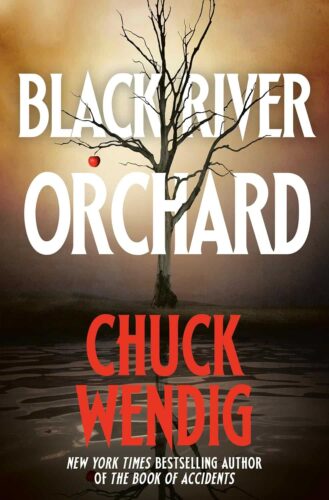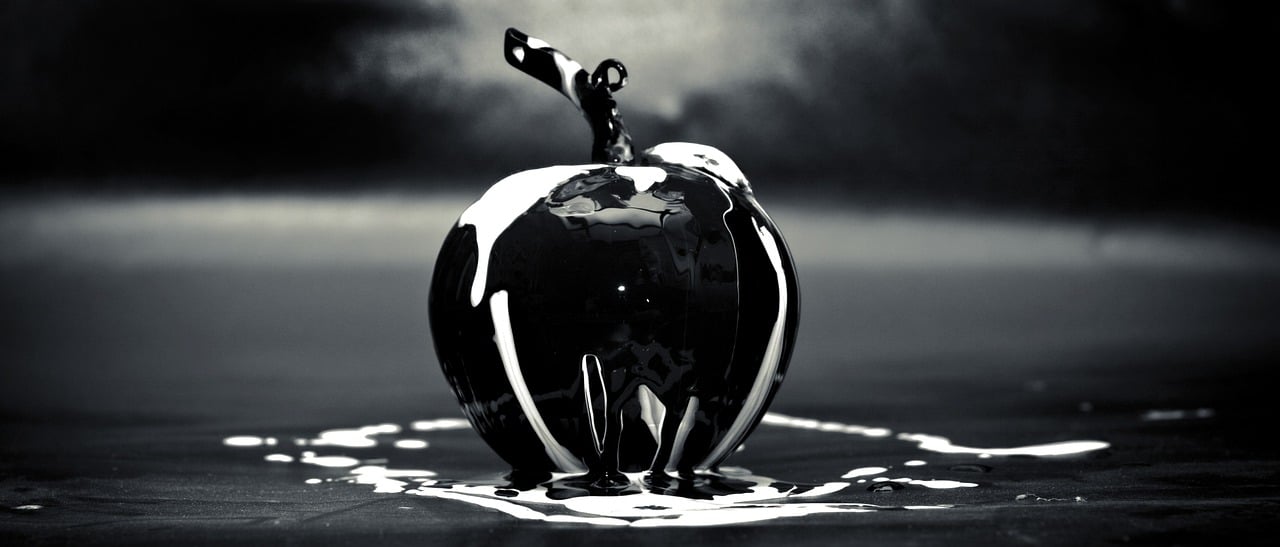 This Book Is One Bad Apple
This Book Is One Bad Apple
Author: Chuck Wendig
Dan Paxson is holding on to his father’s crumbling legacy, no matter what. His only hope is that his newly bred apple, named the Ruby Slipper, will garner enough popularity and therefore enough cash to keep his inherited orchard going. The Crossed Keys, a group of good-old-boy, conspiratorial, wealthy white men, once again have their eyes on Dan’s orchard, and this is his last chance to make daddy proud and claim his way in the world. The only issue: something is sinister about this apple.
Meanwhile, Paxson’s teenage daughter, Calla, is growing in the world of social media influencers. With her boyfriend’s help, she plans to film a protested school race, pointing out discrimination against trans athletes. Instead, what she gets is a horrible video of a gruesome accident that will eventually put her in the heart of the conspiracy. The good thing: Calla hates apples and won’t eat the Ruby Slipper. The bad thing: Calla’s boyfriend, Marco, loves the apples.
Meanwhile, across town, newlyweds Meg and Emily are having quite the civilized confrontation, hiding a world of hurt. Meg is an up-and-coming attorney who has, somehow, worked her way into the Crossed Keys. Emily is her I-don’t-want-to-be-in-this-small-town wife. Emily is also having some serious doubts about their marriage . . . plus she’s allergic to the apples her wife keeps bringing home.
Somewhere else in the town, Joanie and her husband Graham are running their decadent, but tastefully on-the-low S&M air BNB. But the secret is out, and Joanie does love a good bit of shock value. She throws her peace-offering of apples away.
Tying all these people together, is John Compass. Compass is an ex-soldier (sniper), newly minted non-violent Quaker, half-Native American, apple searcher, and he has followed his friend’s mysterious disappearance to this out-of-the-way little town of Harrow. When he finds the secret, it’s up to him and the few non-apple eaters to band together and save the town and possibly civilization.
As you can tell by the extremely long-winded, disjoined introduction, Black River Orchard is a giant book with a lot of barely connected, quite frankly silly things happening at the same time. There is also a hell of a lot of virtue signaling and characters created to make a political point (as averse to telling a chilling story). There is very little actual action though, and even less explanation for this half snooze fest, half body horror story.

Image by SplitShire from Pixabay
The only true virtue is the quality of the Audible book, where various narrators are used for this ridiculously large cast. That was nice. A good bit of production value. But the rest of it . . .
If you’re expecting a Garden of Eden, back to the sources of evil (i.e. that proverbial Edenic apple) guess again. We’ll spend a lot of time with the effects of the apple: the look of the apple, the taste of the apple, the impact of the apple on an increasingly numb and violent society . . . but we’ll barely get any explanation on the “why” behind the apple. As a matter of fact, this central aspect of the apple narrative is so back burner that the author must throw in an epilogue to give us a bit of a glimpse behind the demonic curtain. Of course, by then we have long since lost interest.
The story’s painful slowness is not really the death knell though, although it doesn’t help. It’s the fact that the characters are so wooden and, frankly, so unlikable. The only character with any sense of empathy or charity is John Compass, and he barely qualifies. He’s the “wise man” stereotype, but at least he’s not hateful. Everyone else is either a non-entity or a selfish personification of a poorly thought-out and poorly represented ideology. Let me give you some examples.
Let’s start with the character I hate the most: Calla. First . . . teenagers in horror books are usually just annoying. Wendig does not destroy this stereotype. Ten seconds in, we hear that Calla wants to be a social media influencer, and it’s all we can do to keep our collective eyes in our heads because we are rolling them so hard. I mean . . . please, no. But yes, and so we get long chapters all about Calla’s social media and about her friends, who give “going viral” advice. It’s so tedious.

Image by Carsten Müller from Pixabay
But don’t worry, because Calla is the textbook teenager in other ways that will also make you hate her. She doesn’t care about anyone but herself. Her “causes” (if you can really call recording a video and posting it online a cause) are blatant self-promotion. She doesn’t care about any of them, or about anyone else, and the narrative makes no bones about this, simply calling her a typical teenager and lovingly forgiving her selfishness. Maybe the narrators do. We do not.
Then there is Emily, with whom we spend more time than some of the others. We’re supposed to sympathize with her (here it comes) because she cheated on her wife and her wife (the evil Meg) has been nice to her about it. Excuse me? WTF. NO. NO. NOOOOO. This is not the “good” character.
Joanie is added for shock value (I guess?) and her later ability to apparently wield a shotgun with ease. I’m no prude, but did we really need the long diatribes about her alternative sexual lifestyle and open marriage, with her adding how she pegs her husband into every conversation to upset the townsfolk. I mean . . . we’re supposed to be focusing on this apocalyptic horror, right? Who cares about this B&B, much less what the town thinks of Joanie and vice versa?
But oh yeah, I guess we do have to get back to the literal fruits of evil. Finally, after spending an absurd amount of time with hateful/boring characters, we get back to the bad apple in the bunch (haha, see what I did there). And that’s where it gets even weirder and less explained. We have creatures with apple seeds for teeth and orchards that feast on innocent humans and a man who is running it all but can’t bother to control his own daughter . . . and somehow this all comes to a head. And the apples are so smart, and Dan is so smart . . . but somehow they miss the completely obvious and the day is saved after a few final pages of ill-planned action and trauma. Yawn. Is it over yet?
Black River Orchard sounded so unique, so promising from the write-up. I was so excited to read it. But this apple is the pits, and its sour seeds do not land on fertile imaginative ground. Go elsewhere for a chilling, unusual story, because this book is half poorly executed woke ideology and half time killing conversational fluff. Not recommended, although cheers to the Audible narrators who still, somehow, managed to read this with life and magic. They deserve a promotion.
– Frances Carden
Follow my reviews on Twitter at: https://twitter.com/xombie_mistress
Follow my reviews on Facebook at: https://www.facebook.com/FrancesReviews
- Book Vs Movie: The Shining - April 6, 2020
- Thankful For Great Cozy Mysteries - December 13, 2019
- Cozy Mysteries for a Perfect Fall - October 20, 2019


